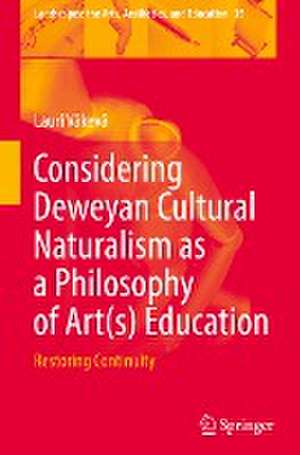Considering Deweyan Cultural Naturalism as a Philosophy of Art(s) Education: Restoring Continuity: Landscapes: the Arts, Aesthetics, and Education, cartea 35
Autor Lauri Väkeväen Limba Engleză Hardback – 22 aug 2023
The book is written in the form of a conditional argument that considers the consequences of cultural naturalism for today’s philosophical problem-solving in art(s) education. It contains a systematic and historical analysis of cultural naturalism that support the philosophical reflection of educators and other scholars operative in this field. The result is a late modern reading of Deweyan cultural naturalism that highlights the continuance of key philosophical ideas from the modern to present discourses. The key topics discussed are of particular interest to present-day art(s) educators: ecological sustainability, social justice, and technological transformation of culture. In addition, this book provides an example of pragmatist argumentation, suggesting an alternative to analytical and post-philosophical approaches.
Din seria Landscapes: the Arts, Aesthetics, and Education
- 20%
 Preț: 690.44 lei
Preț: 690.44 lei - 18%
 Preț: 894.34 lei
Preț: 894.34 lei - 18%
 Preț: 892.11 lei
Preț: 892.11 lei - 18%
 Preț: 728.60 lei
Preț: 728.60 lei - 22%
 Preț: 639.73 lei
Preț: 639.73 lei - 15%
 Preț: 639.73 lei
Preț: 639.73 lei - 18%
 Preț: 948.79 lei
Preț: 948.79 lei - 20%
 Preț: 565.09 lei
Preț: 565.09 lei - 15%
 Preț: 642.83 lei
Preț: 642.83 lei - 15%
 Preț: 644.95 lei
Preț: 644.95 lei - 24%
 Preț: 1158.52 lei
Preț: 1158.52 lei - 15%
 Preț: 645.28 lei
Preț: 645.28 lei - 18%
 Preț: 788.09 lei
Preț: 788.09 lei - 15%
 Preț: 704.50 lei
Preț: 704.50 lei - 15%
 Preț: 646.30 lei
Preț: 646.30 lei - 15%
 Preț: 647.73 lei
Preț: 647.73 lei - 18%
 Preț: 998.66 lei
Preț: 998.66 lei - 18%
 Preț: 733.96 lei
Preț: 733.96 lei - 18%
 Preț: 784.92 lei
Preț: 784.92 lei - 18%
 Preț: 891.48 lei
Preț: 891.48 lei - 15%
 Preț: 701.40 lei
Preț: 701.40 lei - 18%
 Preț: 786.66 lei
Preț: 786.66 lei - 18%
 Preț: 885.49 lei
Preț: 885.49 lei -
 Preț: 384.48 lei
Preț: 384.48 lei - 18%
 Preț: 898.43 lei
Preț: 898.43 lei - 15%
 Preț: 641.71 lei
Preț: 641.71 lei -
 Preț: 350.89 lei
Preț: 350.89 lei - 18%
 Preț: 941.68 lei
Preț: 941.68 lei - 18%
 Preț: 779.39 lei
Preț: 779.39 lei - 18%
 Preț: 786.18 lei
Preț: 786.18 lei
Preț: 781.15 lei
Preț vechi: 952.61 lei
-18% Nou
Puncte Express: 1172
Preț estimativ în valută:
149.52€ • 162.47$ • 125.68£
149.52€ • 162.47$ • 125.68£
Carte tipărită la comandă
Livrare economică 21 aprilie-05 mai
Preluare comenzi: 021 569.72.76
Specificații
ISBN-13: 9783031388163
ISBN-10: 303138816X
Ilustrații: XIV, 154 p. 1 illus.
Dimensiuni: 155 x 235 mm
Greutate: 0.42 kg
Ediția:1st ed. 2023
Editura: Springer International Publishing
Colecția Springer
Seria Landscapes: the Arts, Aesthetics, and Education
Locul publicării:Cham, Switzerland
ISBN-10: 303138816X
Ilustrații: XIV, 154 p. 1 illus.
Dimensiuni: 155 x 235 mm
Greutate: 0.42 kg
Ediția:1st ed. 2023
Editura: Springer International Publishing
Colecția Springer
Seria Landscapes: the Arts, Aesthetics, and Education
Locul publicării:Cham, Switzerland
Cuprins
Art(s) and late modernity.- Locating cultural naturalism.- Cultural naturalist aesthetics, philosophy of art, and art(s) education.- Post-philosophical approaches to (the) art(s).- Art(s) education philosophy for the late modernity.
Notă biografică
Lauri Väkevä is a professor of didactics of crafts and arts at the University of Helsinki, Finland. A co-author of three books, he has also published several chapters and numerous articles in peer-reviewed journals and presented papers at international conferences in music education, musicology, music history, and popular music studies.
His main research interests cover pedagogy of the crafts and arts, music education, educational philosophy, philosophy of art, pragmatism, informal learning, popular music, and digital culture. Aside from academic career, his work assignments have covered working as a musician, a music journalist, a general music teacher, and an instrumental teacher.
Textul de pe ultima copertă
This book makes a case for cultural naturalism as a basis for a philosophy of art education. It argues for a holistic approach that avoids hard boundaries between artistic disciplines in the educational context, applying cultural naturalism to challenges that are topical for the whole art(s) education field, including challenges related to ecology, social justice, and technological transformation of culture.
The book is written in the form of a conditional argument that considers the consequences of cultural naturalism for today’s philosophical problem-solving in art(s) education. It contains a systematic and historical analysis of cultural naturalism that support the philosophical reflection of educators and other scholars operative in this field. The result is a late modern reading of Deweyan cultural naturalism that highlights the continuance of key philosophical ideas from the modern to present discourses. The key topics discussed are of particular interest to present-day art(s) educators: ecological sustainability, social justice, and technological transformation of culture. In addition, this book provides an example of pragmatist argumentation, suggesting an alternative to analytical and post-philosophical approaches.
The book is written in the form of a conditional argument that considers the consequences of cultural naturalism for today’s philosophical problem-solving in art(s) education. It contains a systematic and historical analysis of cultural naturalism that support the philosophical reflection of educators and other scholars operative in this field. The result is a late modern reading of Deweyan cultural naturalism that highlights the continuance of key philosophical ideas from the modern to present discourses. The key topics discussed are of particular interest to present-day art(s) educators: ecological sustainability, social justice, and technological transformation of culture. In addition, this book provides an example of pragmatist argumentation, suggesting an alternative to analytical and post-philosophical approaches.
Caracteristici
Presents a case for cultural naturalist philosophy in art(s) education Provides an example of late modern philosophizing in the field of art(s) education Suggests a naturalist critical reading of Dewey’s later philosophy in art(s) education philosophy
